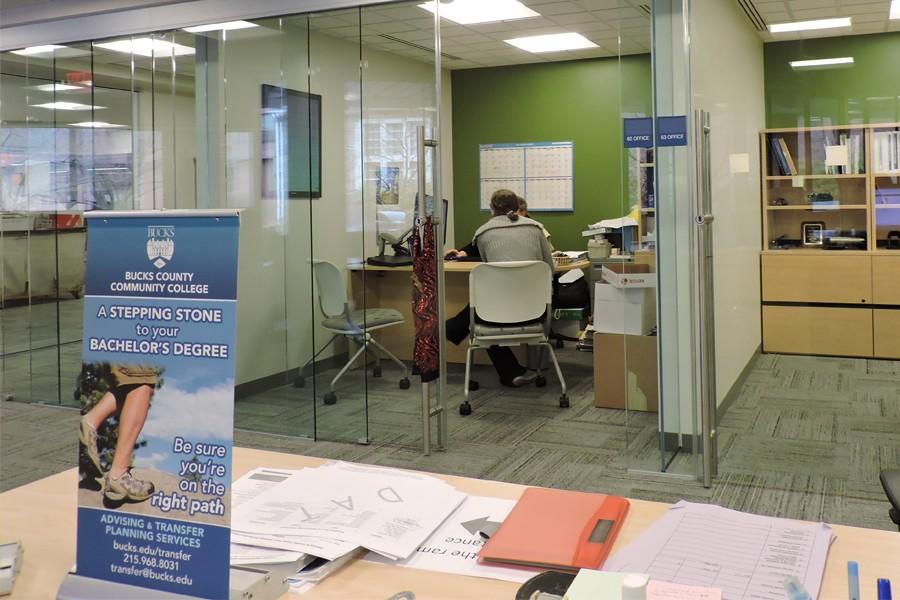To increase retention, Bucks has revamped its advising services and instituted an assigned advisor for every student, full- or part-time, receiving mixed reviews from both students and faculty.
In light of the 6 percent enrollment drop this semester, Bucks is looking for ways to bring in new students, and keep them coming back next semester. One way the administration hopes to accomplish that is by streamlining the registration and advising process for new students.
The “New Student Orientation, Advising, and Planning Handbook” created by the Advising and Transfer Center has been instrumental in guiding new students.
Ronni November, director of the Advising and Transfer Center, explained the handbook, given out during new student orientation, helps new students with everything from setting up their Bucks email to getting them thinking about transfer schools.
Each new student is given an educational planner, a person assigned to help them with their first semester at Bucks. The educational planner will follow up with the new student’s progress around the three-week mark and then mid-semester a faculty advisor will be assigned to the student based on his or her major.
“We want to foster a personal connection with students,” said November.
The goal of the assigned advisor is to provide students with a “go to” professor in their major that can help them with course selection and transfer questions.
“Evidence across the country shows that if students are left on their own, the lack of guidance leads to students dropping out,” said Dr. Clayton Railey III, provost and dean of Academic Affairs at Bucks.
“We’re trying to provide a structure that allows [students] to meet their goals time wise, financially and academically,” said Railey.
Initially, each full-time professor was to be assigned 25 advisees by the dean of their department. However, problems arose, as there are more students than full-time faculty can reasonably advise.
“We’ve invited part-time faculty to take on the overflow of students,” said Railey.
But this has not been enough to manage the number of advisees. The administration has instituted “overload compensation” for full-time professors who take on more than 25 advisees, up to 70 students.
During Bucks’ President Dr. Stephanie Shanblatt’s open forum held on April 7, Language and Literature Professor Chris Bursk said many of the faculty in his department have 71 advisees.
Pat Engle, associate professor of Language and Literature, and vice-president of the faculty union, spoke out during the meeting, as well, saying it was commendable that professors were taking time on the weekends to do advising, but was concerned the overflow of advisees was overwhelming the faculty.
John Strauss, faculty union president, said, “There are all kinds of issue depending on who you talk to.”
“It’s a struggle to find a balance between teaching, improving as professionals, and advising,” said Strauss.
Railey shared Strauss’s view, saying, “The most challenging aspect has been balancing the advising needs of students with appropriate number of students for faculty.”
“We don’t want faculty to have too many students and have it affect the quality of help they can give,” Railey added.
“What’s good for the students is what’s most important to the faculty,” said Engle.
During her open forum Shanblatt asked faculty to think about how to fit advising into their schedules and what it means to be a full-time faculty member.
“We need to take a step back and re-evaluate what it is to be a full-time faculty member,” said Shanblatt during the forum.
The assigned advisor has been a welcomed change to the majority of students interviewed for this article.
Phil Stimmel, 21, an information technology major, and Kaylah Visnesky, 19, a culinary apprenticeship student, described the advising process and new student planning module as “easier and more convenient,” than the old Webadvisor system.
“I think it’s great to have a mandatory advisor,” said Visnesky.
Another student Michael Hinterlong, 19, a computer science major, said, “I believe it’s very effective to know your advisor personally.”
However, some students have already circumnavigated the assigned advising change.
“I emailed the professor who helped me last semester to help with my classes, but she isn’t my assigned advisor,” said Reilly Egan, 18, a fine arts major.
“I went to a teacher I was friendly with and I think it’s a good idea for students to have that option,” said Kayce Dygert, 19, a fine arts major.
Others have found the change less than desirable, and have run into glitches, as the administration and faculty work out the kinks.
“It’s a lot more tedious now. Before you could get advising from anyone, now it’s more time-consuming, especially for full-time students who work,” said Joe Woll, 21, nursing major.
Chris Saraullo, 21, described how he still receives emails from the engineering department about advising, despite switching his major to computer networking technology last semester.
“I get emails from an engineering professor saying he’s my advisor, but I switched to a certificate program last semester.”
One liberal arts major, Missy Henry, 19, described how it took her weeks to finally meet with her advisor after sending many emails to setup an appointment.
“Finally, she told me she would post times on Canvas for advising appointments, which took almost a week for her to do,” said Henry. “My advisor’s the one who’s supposed to be able to help me and tell me what I need to do.”
Unlike other majors, liberal arts majors can be assigned a professor or faculty member from any department since the students in liberal arts are labeled “undecided.”
Students also have the option to change their advisor by contacting the dean of their major.
“It’s going to take a while to get used to it, it is a big change,” said Railey.


